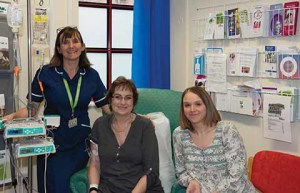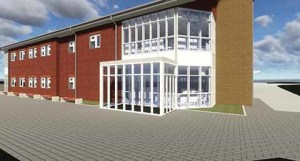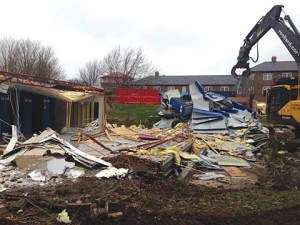Transforming cancer care in Dorset
Ray Fairclough on an exciting development and an extraordinary man
Published in September ’17
For years, patients from all over the county have had to travel to the Dorset Cancer Centre at Poole Hospital for radiotherapy treatment. That can mean a daily journey for up to six and a half weeks – a source of tremendous physical, emotional and financial hardship on people at a time when they feel sick, vulnerable and probably quite scared. It is far from ideal.
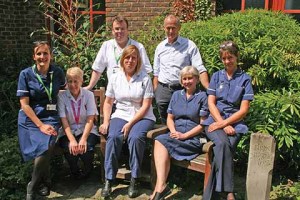
Members of Dorset County Hospital Cancer Centre clinical team – Abi Orchard, Kay May, Maria Bennett, Tracey Turnbull, Karen Buckingham, Robert Mitchell, Perric Crellin
So the opening next spring of the Robert White Radiotherapy Unit and Dorset County Hospital Cancer Centre in Dorchester has been universally well received, a rare good news story for the NHS in straitened times. It is a £9.15 million partnership between Poole Hospital and Dorset County Hospital, made possible by a donation from a major legacy left by Poole businessman Robert White, who died in 2015. The radiotherapy unit will be run as a satellite of Poole Hospital, where the machines currently operate at 96 per cent capacity – among the most heavily used in the country.
‘It is impossible to overstate the strain on patients having to travel the breadth of the county for days and often weeks on end at such a difficult time, so this new unit will improve the provision of radiotherapy to patients immeasurably,’ says Abi Orchard, lead cancer nurse on Dorset County Hospital’s Fortuneswell Ward.
The building of the radiotherapy unit has also presented an opportunity to create a new cancer outpatients department above it and to improve the hospital’s existing chemotherapy department.
The Dorset County Hospital Cancer Centre will provide much improved facilities for outpatients, with seven new consulting rooms, three other private rooms for counselling and a waiting area that will double as a meeting point for out of hours support groups and presentations.
It will also enable the chemotherapy unit on the Fortuneswell Cancer Ward to be enhanced so that, for the first time, there will be adequate space for patients to bring a friend or family member with them while they receive chemotherapy – a treatment that can take many hours and which is often associated with a lot of fear and anxiety for patients and their loved ones.
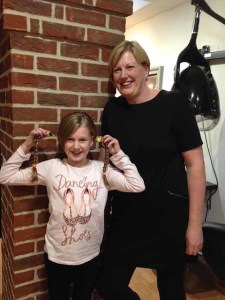
Ruby Cox with her mum, Angela Ingram, and the hair she gave to the Little Princess Trust, which makes children’s wigs from donated hair. The hair stylist Celeste Ealson also donated her fee to the Cancer Appeal and when all the money had been collected, Ruby was able to present a cheque for £1150.
‘The new radiotherapy unit will be operated by Poole, so the radiographers that provide the service will be from Poole, while Dorset County Hospital will provide outpatients services,’ explains Abi. ‘There is a long history of collaborative working between the hospitals, especially in cancer care – the oncologists are all based in Poole and come to Dorchester to conduct patient consultations.
‘To be able to provide chemotherapy services in a more appropriate environment will greatly improve the patient experience. The whole project is going to make an enormous difference to a lot of people.’
As part of the project, Dorset County Hospital Charity is raising £1.75 million in a cancer appeal that will provide outpatient, counselling and support facilities for all cancer patients and fund the improvements to the chemotherapy unit. With the help of Fortuneswell Cancer Trust, the charity’s main partner in the appeal, more than £1,125,000 has already been raised.
‘The support of the community has been absolutely key in all of this,’ says David Evans, chair of Fortuneswell Cancer Trust, which was founded in 1998 to work towards the establishment of a dedicated cancer unit in West Dorset. ‘It’s local people that keep us going. So many people raise money for us, from village fetes and coffee mornings to sponsored runs and head shaves. People feel very connected to the new unit – after all, cancer touches all our lives in some form or another.’
The four radiotherapy machines at Poole are in urgent need of replacement, but without the space in which to house a new machine, to do so would mean compromising the provision of radiotherapy services. Creating two new bunkers at Dorchester will allow the full continuation of current services whilst enabling the sequential service and replacement of those machines.
‘We’re centralising the expertise in the Cancer Care Unit at Poole but delivering it closer to people’s homes in Dorchester,’ says Dr Mike Bayne, clinical oncologist and the consultant who looked after Robert White. ‘There have long been discussions about siting a radiotherapy unit in Dorchester, but now the technology has reached a point where it is possible to run an effective satellite operation from Poole. The quality of treatment we’ll deliver is no different from what we do at the moment, but the new unit means we will have a more effective cancer centre that is better able to develop the technology as we go forward.’
The new unit seems to have had a galvanising effect on the community, especially since contractors Interserve broke ground on the Bridport Road site. The buildings are starting to take shape and, unlike most major urban building works, no objections have been raised.
‘People can see progress being made, which all helps increase awareness of what we’re doing and why we’re doing it,’ says Peter Greensmith, chair of Dorset County Hospital Charity. ‘Our work is to enhance what is being provided by the NHS and to that extent it is a textbook example of how I think these things will work in the future.’
So many people who have raised funds for the Cancer Appeal have stories to tell, but one of the simplest and most heart-warming must be that of young Ruby Cox, whose mum, Angela Ingram, is a colo-rectal nurse specialist. Last October, aged just ten, Ruby decided she would donate her hair to make wigs for children who need them. She set up a Just Giving page online and raised more money through sponsorship, including hair stylist Celeste Ealson from Tahnee’s in Wyke Regis, who donated her fee, and Ruby finally presented a cheque for £1150 to the Cancer Appeal.
‘We’re working with a lot of other charities and organisations,’ adds Peter, ‘and there’s a great deal of goodwill out there. Once people are aware of the project they are incredibly generous. It’s a sad fact that cancer will affect one in two of us as we get older, so this project is very personal. There are at least 4500 radiotherapy patients who will be spared the arduous journey to Poole once the unit opens next spring, but when you consider the wider family members who are also affected when a person is undergoing treatment, this unit will benefit tens of thousands of Dorset people.’
To support the Cancer Appeal at Dorset County Hospital in any way, please contact Rachel Cole on 01305 253215. www.dchft.nhs.uk/charity
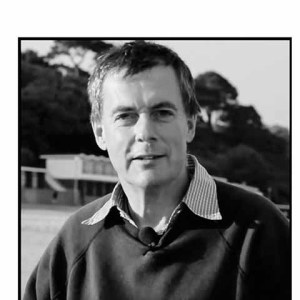 Robert White
Robert White
Born in Poole, Robert White founded a highly successful specialist photography business that enjoyed an international customer base.
‘Robert was a remarkable man,’ says consultant Dr Mike Bayne. ‘He was a highly motivated and very successful businessman who had an incredible eye for things that would gain value. If he wanted anything, he would always buy the best and usually buy two of them, which meant he had a warehouse full of collectables.’
Having presented with advanced pancreatic cancer, Robert was treated by Dr Bayne for two years before he passed away in 2015.
‘Robert sought opinions on his cancer in the States and at the Royal Free, but in the event had all his treatment and care in Poole. As it became clear his time was substantially shorter than he would have wished for, he was determined to put his collection to good use and wanted to help the cancer unit to create a lasting legacy that would recognise his contribution and benefit the community for many years to come.
‘I’d never come across anything like this before so I drew up a wish list of what could be done, which we then refined together and came up with the plans which are now being put into action. The new radiotherapy unit would not be happening without Robert’s legacy.’
